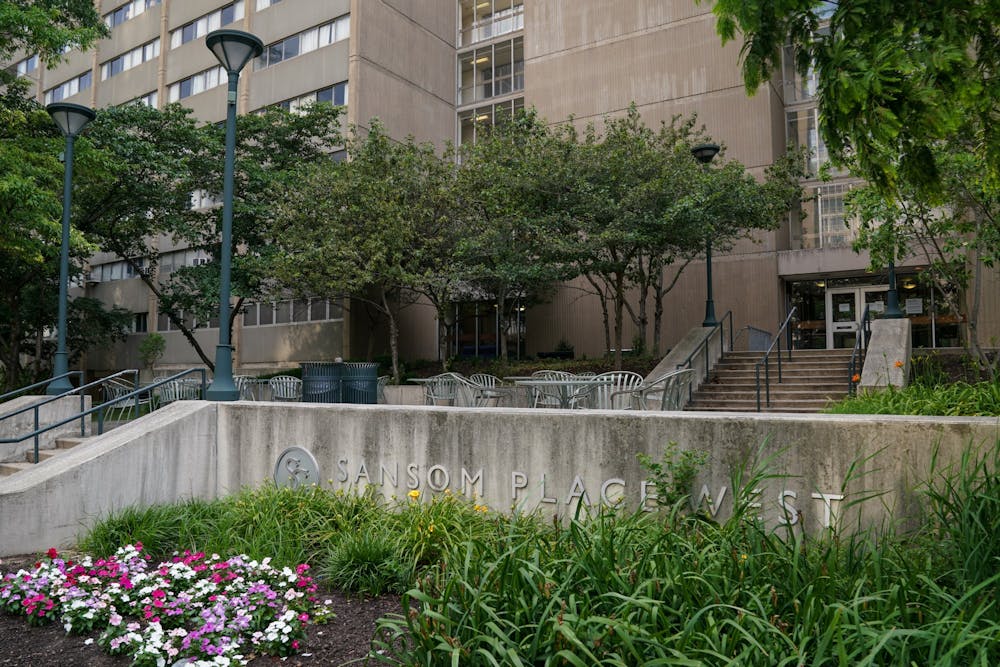
Sansom Place West will close at the end of the 2022-2023 academic year, making Penn the only Ivy League university not to offer graduate on-campus housing.
Credit: Chase SuttonPenn will become the only Ivy League university to not offer on-campus housing exclusively for graduate students.
In mid November, Penn Off-Campus Services announced that Sansom Place West — currently the only Penn-owned graduate student housing option — would close at the end of the 2022-2023 academic year, according to Graduate and Professional Student Assembly leaders. The imminent closure of Sansom Place West comes after Sansom Place East closed in April 2022 for redevelopment into a privately-owned apartment building.
In response to a request for comment, Penn Business Services Director of Communications and External Relations Barbara Lea-Kruger directed The Daily Pennsylvanian to the Graduate Housing tab on the Penn Residential Services website. The site offers information about privately owned graduate student housing and rental search services.
Sansom Place West, which is located at 3650 Chestnut St., currently houses a few hundred graduate students, according to GAPSA president Robert Watson. In 2019, Associate Vice Provost for Graduate Education Anita Mastroieni told the DP that about 600 graduate students were living on campus, with around 75 acting as residential advisors in undergraduate college houses.
GAPSA Executive Board members said that they had been told that the closing of Sansom Place West is due to plans for renovation. In Feb. 2021, a $10 million renovation plan for Sansom Place West was approved by the Board of Trustees Budget and Finance Committee. The plan includes upgrades to Sansom Place West’s interior and infrastructure, including aesthetic and fire panel improvements.
GAPSA Executive Board members said that they were informed that the on-campus housing option would be ending at the same time as the public announcement was made. They expressed frustration that the change had not been communicated earlier, alleging that no opportunity was provided for GAPSA to offer input.
“We just want conversations to happen in a transparent, collaborative way and to be in the room when decisions are made that directly affect us,” GAPSA Executive Vice President Hoang Anh Phan said.
Penn previously offered additional graduate student housing in Sansom Place East, another formerly University-owned high rise building located at 3600 Chestnut St. However, that building closed as a result of a $94 million renovation plan that began in April 2022 under a private operator and developer.
Now known as The Accolade on Chestnut, the building that was known as Sansom Place East is now operated by Greystar and is currently leasing studio, one-bedroom, and two-bedroom graduate student apartments for fall 2023.
Greystar, a company that has faced a lawsuit from renters for allegedly predatory pricing tactics, declined a request for comment. Rates in the Accolade range from $1,240 for a room in a shared apartment to about $1,590 for a studio, while Sansom Place West offers four different price levels, ranging from $1,117 to $1,988 per month.
GAPSA said that the cost per square foot is significantly more expensive at the Accolade in comparison to comparable private apartments. Watson said that the closure will likely have a financial impact on students, forcing them to seek housing from what he said was the more expensive private market, and explore less accessible options farther from campus.
Beyond the financial hardship that GAPSA leadership said this decision will place on students, they said that on-campus housing is essential for social and academic wellness, because it offers a space for students to find community and connect with each other.
“Housing is not just where you’re going to live,” GAPSA Vice President of Advocacy Joelle Eliza Lingat said. “It’s an integral part of the lifeblood of being a member of the academic community.”
Watson said that advocating for affordable, high-quality University-owned housing has been a central GAPSA advocacy point over the past year. They have surveyed students informally to see what they are looking for in terms of affordability, quality, and closeness to campus. Accessible housing has also been a discussion point in meetings with administrators, Watson said.
Specifically, the GAPSA Executive Board members said that they hope the University will offer subsidized housing for graduate students, which is an important part of their efforts toward diversity and inclusion.
“One of GAPSA’s big goals is to support students who might have large financial burdens like health costs and supporting family members or children,” GAPSA Director of Equity and Access Emily Getzen said. “Affordable housing close to campus is an essential part of supporting these students.”
GAPSA members added that they hope Penn will act in accordance with several of its peer institutions that already offer subsidized graduate student housing, including Columbia and MIT. They also pointed out that Penn is currently the only Ivy League school that does not offer family housing.
Above all, GAPSA executive board members said that they want the University to better prioritize graduate student needs by allowing them to give input on housing and other issues that impact them.
“We contribute so much intellectually to the University and play so many different roles, from research to mentoring undergraduate students,” Phan said. “It should be a part of Penn’s mission to listen to us and support our basic needs.”
The Daily Pennsylvanian is an independent, student-run newspaper. Please consider making a donation to support the coverage that shapes the University. Your generosity ensures a future of strong journalism at Penn.
Donate







